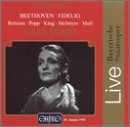| All Artists: Ludwig van Beethoven, Karl Böhm, Munich Bavarian State Orchestra, Donald McIntyre, Friedrich Lenz, Hans Wilbrink, Hildegard Behrens, James King, Kurt Moll, Lucia Popp, Nikolaus Hillebrand, Norbert Orth Title: Beethoven: Fidelio Members Wishing: 2 Total Copies: 0 Label: Orfeo D'or Original Release Date: 1/1/1978 Re-Release Date: 9/25/2001 Album Type: Import Genre: Classical Styles: Opera & Classical Vocal, Historical Periods, Classical (c.1770-1830) Number of Discs: 2 SwapaCD Credits: 2 UPC: 675754427627 |
Search - Ludwig van Beethoven, Karl Böhm, Munich Bavarian State Orchestra :: Beethoven: Fidelio
 | Ludwig van Beethoven, Karl Böhm, Munich Bavarian State Orchestra Beethoven: Fidelio Genre: Classical
|
Larger Image |
CD Details |
CD ReviewsReally, four and a half stars L. Lubin | NY, NY | 08/01/2008 (4 out of 5 stars) "As the story goes, at age 5 Karl Boehm saw his first opera, Fidelio, and became obsessed. His parents gave him a score, he learned to read it, and the rest , as they say, is history. This was Boehm's last new production of the opera, and very near the end of his life. He was said to be difficult to follow by then, and somewhat erratic of tempo, but tthere is great drive and spontaneity in this performance, and the singers, an ideal cast of the period, is extraordinarily attentive. For those of us accustomed to the superhuman steel of Flagstad or Nilsson, Hildegard Behrens voice in Fidelio, or in Wagner, requires an adjustment. However, it should be remembered that voices trained to the demands of Wagner and Strauss did not exist in Beethoven's time, and roles of this weight were extremely rare. More than likely Beethoven had in mind a big lirico-spinto type voice, and Behrens fills that bill quite well. I saw her Leonore at the Met in her debut season and again in one of her last performances in the house. Her trademark warmth and humanity, qualities that make her Brunnhildes so special, make her interpretation of this role unforgettable. She is not at her absolute best here, but still manages to drive the Munich audience wild with as passionate an "Abscheulicher" as you are likely to hear from anyone. Rocco is as big a part as Leonore, sixteen numbers each, and requires nearly the same power and stamina for the bass. Kurt Moll is more than up to the part, singing with poer and authority when needed and using his famous pianissimo to balance the canon quartet. Unfortunately, his shouting of the dialogue is unsettling. Lucia Popp was a last minute replacement for an ailing colleague (Edith Mathis or Helen Donath, I'm not sure which), which explains some tentativeness despite the fact that she had been singing the part for years. As I said, Boehm had become difficult to follow, but she is in excellent voice and grows more comfortable by the middle of the first act. Donald McIntyre's worn voice does not make for the suavest of Don Pizarros on record, but he doesn't stint on character. He's the weak link in the cast. Norbert Orth is more than adequate as Joaquino. Not an especially greatful role, but he has a few crucial lines here and there. No complaints, at least. James King might be past his prime here, I had seen him Frau ohne Schatten a few months earlier and he sounded rather worn, but you would hardly know it from the sounds he makes. Even singing softly in the 2nd act finale, he cuts through the six other soloists and the chorus like a knife. On first hearing I thought his cut-offs too abrupt, but this seems more a matter of rythmic precision than shortness of breath. His virile tone and sheer power make "Gott, welch Dunkel hier!" thrilling, but htere is no lack of real pathos, either. The problem of spoken dialog in a live context is thorny. You really can't edit it down. The engineers at Orpheo have at least place cues so that you can skip the spoken parts without missing any music. Perhaps in Beethoven's day singers intoned the dialog rather in the French manner. This today is a lost art, and not likely to be revived. Studio recordings geared to the english speaking market keep the dialog to a minimum; performances in Germany play to a native audience. The real star of this performance, though is Karl Boehm. Whatever his physical limits may have been, this is a vibrant, vital performance born of eighty years' knowledge and experience. The customary 2nd act scene change cover of the 3rd Leonore Overture becomes a logic extension of the "Namenlose Freude" duet, building in tempo and intensity until the audience explodes into applause. This is not the indespensible Fidelio. That would have to be Klemperer's classic with Ludwig and Vickers. But here is its polar opposite. I find I can't live without either. " An historic performance but not one of the greatest J. Chiu | Washington, DC | 12/17/2004 (3 out of 5 stars) "I must second the prior reviewer's reaction and caution purchasers that, despite the solid conducting and singing, in general, the opera is weighted towards the Leonore. It is amazing that Behrens sang this and other hoch-dramatisch roles, as she basically has a lyric instrument which cannot convey the true power of Leonore. A secondary blemish on this recording is the inclusion of too much of the dialogue --- this is also over-acted (probably in a traditional, German opera house manner) to the point where it sounds like chickens squawking. It emphasizes the dichotomy between the Singspiel and the rest of the opera."
|

 Track Listings (16) - Disc #1
Track Listings (16) - Disc #1